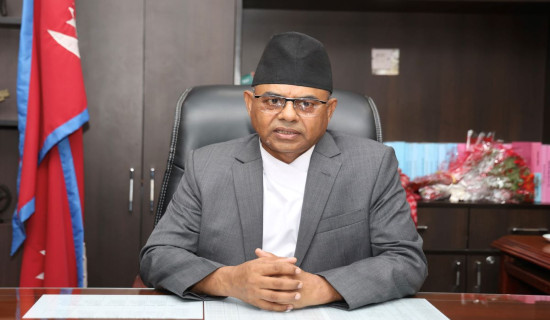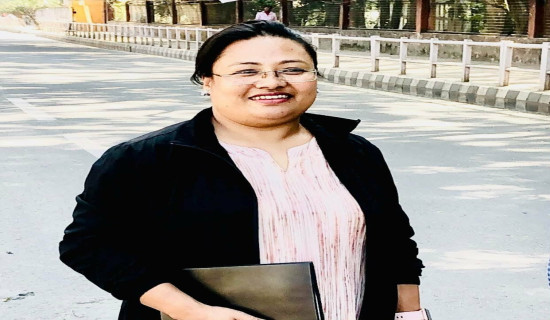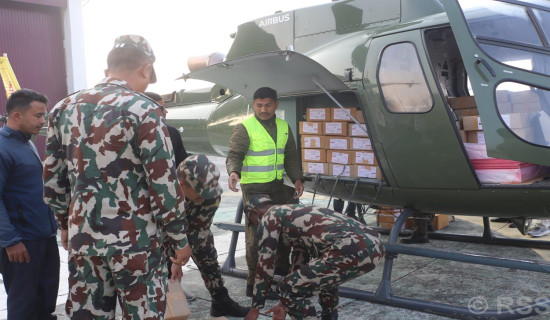- Thursday, 26 February 2026
Ensure Public Ownership Of Lawmaking
Rule of law is a basic tenet of democracy. If a nation has a robust rule of law, it will essentially have a strong and durable democracy. But what is rule of law and how can it be meaningful? The first element of rule of law deals with the process of law making – which ought to be transparent and participatory. According to the Constitution of Nepal 2015, all three tiers of the state – federal, province and the local level – are entitled to make their own laws remaining within their constitutionally and legally defined limits. Presently, there are 334 members in the two Houses of the Federal Parliament - 550 members in assemblies of seven provinces and over 25,000 elected representatives in legislative bodies of 753 local levels. All of them are called lawmakers. Numerous essential laws on federal governance, police system in provinces, civil service system in provinces, education and health have not been formulated yet.
From federal to province to local level, each tier has faced unique challenges in the lawmaking. Take for instance the recently concluded session of the federal parliament - the MPs themselves have lamented that only one single law was passed during the entire session spanning months. In practice, Nepal also faces a unique problem of lawmaking dominated by handful of senior leaders of major parties. They also block any legislation that is against their vested interests. Prime Minister, leader of opposition and president of Nepali Congress rarely take part in committee discussions or House meetings. They do not even participate in House for more than 10 days in entire session.
Prevalent practice
Provincial assemblies have always complained that they lack facilitating federal laws that can allow them to frame their provincial laws in areas like provincial civil service – which are of urgent necessity. Local levels have been found to engage in lawmaking that is either outright copying of model laws distributed by the federal government – without incorporation of local context and circumstances – or haphazard drafting without concerns for due process and content. That apart, the prevalent practice is to enact laws without peoples' participation. Government bodies draft a law to their liking and push it through the parliament with minimal involvement of stakeholders.
The second element of the robust rule of law is concerned with the state of implementation of laws that have been issued. It is firmly held that people must know about the laws of the land and abide by them. This is the first barrier to the implementation of the laws - laws are not adequately disseminated amongst the people. Capacities, willingness, monitoring and enforcement are all necessary to make that happen. Most importantly, there has to be a realisation of how much ownership is felt by the stakeholders including those who are supposed to abide by them.
The third and final element of the robust rule of law deals with the institutions that are responsible for upholding laws, and ensuring check and balance. The people must have easy, economical and intimidation-free access to the institutions of law including the administration and courts. They must be able to get the justice on predictable timeline. They must also be able to feel that justice is being delivered equally – irrespective of caste, gender, region, economic status or political clout. Therefore, the rule of law institutions must be strong enough to serve their purpose. The matters like trustworthiness in terms of their competence, impartiality, independence, accountability, and legitimacy are of utmost importance. This will also determine whether their decisions are easily accepted and implemented. A rule of law system is not judged by the kind and nature of its structure but more importantly by the kind and nature of its implementation.
This will demand a change in all three elements mentioned above. In law making, there is a need to expeditiously formulate essential laws particularly in areas listed under the concurrent list of the constitutional schedule such as policing, civil service, education and health. The Rule of Procedure of the parliament should explicitly state that all MPs must attend at least 50 per cent of the House meetings – otherwise they must face disciplinary action. The bills tabled in the parliament must be settled – passed or rejected – within a certain timeline within the session. Introduction of private member bill must be promoted because the government often tends to refrain from introducing a bill that is not of its liking.
Law implementation
In law implementation, there is a need to first ensure participation in law making for public ownership. Town hall meetings or mobile meetings of parliamentary committees at province and local level can be held to pre-inform the people about the laws. Likewise, the authorities need to be accountable to ensure proper implementation of law. In the institutional development aspect, there is a need to first ensure timely and full appointment of judges and court officials. They need to be held accountable to ensure economical, easy, timely and equal access to law and justice for the people.
Judiciary also must settle cases within stipulated time and if any case is made to linger, there has to be accountability on the part of the courts. For example, a case against the appointment in the constitutional bodies has continued to linger for the past three years without any justification. On the part of the people, they need to be empowered so that they can also rise and demand the robust rule of law in all spheres of their life. The combined efforts of the executive, the legislature, the judiciary and the people will ensure there is a robust rule of law that is transparent and participatory.
(Pradhan Executive Director of Nepal Law Society.)
















